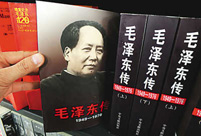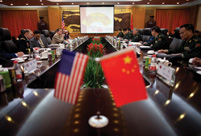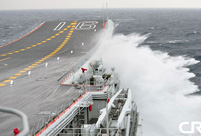 'Jin' named the word of the year by cross-strait netizens
'Jin' named the word of the year by cross-strait netizens Chinese scientific expedition goes to build new Antarctica station
Chinese scientific expedition goes to build new Antarctica station
 Chinese naval escort fleet conducts replenishment in Indian Ocean
Chinese naval escort fleet conducts replenishment in Indian Ocean 17th joint patrol of Mekong River to start
17th joint patrol of Mekong River to start China's moon rover, lander photograph each other
China's moon rover, lander photograph each other Teaming up against polluters
Teaming up against polluters
BEIJING, Dec. 26 -- A peace-cherishing and confident United States should not have found its allies' dual-use technology businesses with Beijing such a headache.
The United States has recently been "feeling the sting" as some of its closest allies are reportedly "hemorrhaging valuable defense technology to China," Tokyo-based The Diplomat magazine wrote on Tuesday, as some Western media kept making a fuss about the French and German diesel engines inside Chinese subs and British propulsion and radar technologies equipped on Chinese fighters, among others.
It is even more thought-provoking that a top Israeli defense official was reportedly forced to step down after Washington was furious about an Israeli decision to "sell military equipment to China."
The European Union officially embargoes arms shipments to China, and Beijing has been urging Brussels to lift the measure. But anyway, dual-use technologies, including diesel engines, are not listed as banned.
No matter what, it is in the need and interests of China, a peaceful nation, to develop its defense capabilities on its own and through legitimate international cooperation with the ultimate goal of protecting its own people. It is also understandable that global defense firms are attracted by the market China offers.
Such consensual businesses need no backseat driver. And should Washington understand Beijing's development rightly, it will feel nothing but easy.
Yet the reality is far from being so relaxed. Imagining China as a foe at present and in the future, some of Washington's elites tend to be uptight about any of China's national defense moves.
Besides spying, they never lose a chance to challenge China's rational and legal decisions like the creation of the Air Defense Identification Zone over the East China Sea, which U.S. Secretary of State John Kerry said last week Washington would not recognize. Later, he pledged to shore up naval aid to southeastern Asian countries, apparently taking aim at China's rising sway in the region.
Without true aspiration for and confidence in peace, a country may easily develop a suspicious mind or be oversensitive about others' behavior.
Maybe before finding fault with others' national defense efforts, it is helpful that some U.S. policymakers rummage through the Pentagon's archives and see how many of U.S. arms deals have actually contributed to peace and stability in other parts of the world.
 Commemorate 120th birth anniversary of Mao Zedong
Commemorate 120th birth anniversary of Mao Zedong Female soldiers of PLA Marine Corps in training
Female soldiers of PLA Marine Corps in training Chinese cities to have a very grey Christmas as smog persists
Chinese cities to have a very grey Christmas as smog persists China and U.S. - the national image in each other’s eyes
China and U.S. - the national image in each other’s eyes The Liaoning's combat capability tested in sea trial
The Liaoning's combat capability tested in sea trial Chinese pole dancing team show their moves in snow
Chinese pole dancing team show their moves in snow Rime scenery in Mount Huangshan
Rime scenery in Mount Huangshan Ronnie O'Sullivan: My children mean the world to me
Ronnie O'Sullivan: My children mean the world to me Shopping in Hong Kong: a different picture
Shopping in Hong Kong: a different picture China's stealth fighters hold drill over plateau
China's stealth fighters hold drill over plateau Chinese navy hospital ship's mission
Chinese navy hospital ship's mission  "Free lunch" program initiated in NW China
"Free lunch" program initiated in NW China  Rime scenery in Mount Huangshan
Rime scenery in Mount Huangshan DPRK's Kaesong Industrial Complex
DPRK's Kaesong Industrial Complex 'Jin' named the word of the year
'Jin' named the word of the year Day|Week|Month